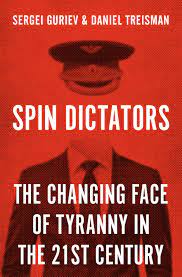
Kathimerini Greece Newsroom
What Russian President Vladimir Putin was hoping to accomplish by invading Ukraine on February 24 was “another Crimea effect (in 2014 his approval rating grew from 60 to 90%),” Russian economist and former chief economist at the European Bank for Reconstruction and Development (EBRD) Sergei Guriev tells Kathimerini. “This war is a major miscalculation by Putin and has certainly shortened the life of his regime,” he adds.
Guriev, who is also the co-author, with Daniel Treisman, of the book “Spin Dictators: The Changing Face of Tyranny in the 21st Century,” believes that the crisis in Ukraine will turn into a crisis in Russia. He describes Putin as one of the most successful modern dictators, explaining why he will now be forced to resort to authoritarian leadership tactics of the last century, with even more adverse consequences for Russian society.
The US and Europe have demonstrated unprecedented unity and imposed sanctions that went far beyond what was expected by Russia and by the markets.
But as Russian society modernizes, and more people get educated, he says, “it becomes too expensive to silence this informed class,” adding that the war in Ukraine is “much longer and bloodier” and is not popular at all in Russia. This is why the last years of Putin “will be especially brutal.”
The economist also foresees a major recession in Russia this year, possibly to the extent of a 10% decline in gross domestic product, while for the eurozone he predicts a “manageable” 1% drop in 2022.
– As one of the authors of Spin Dictators: The Changing Face of Tyranny in the 21st Century,” how would you describe Putin’s profile and how does it connect to the latest developments?
Putin was one of the main inspirations for our book and we profile him in the book as a dictator who uses manipulation of information rather than mass repression, pretending to be a democrat, allowing some opposition parties and some independent media, i.e. being a 21st century’s “spin dictator” rather than a 20th-century “fear dictator.” Putin was not the first spin dictator but is certainly one of the most successful ones.
In the book (and in the research papers the book is based on) we argue that the spin dictator model is better suited to the realities of the modern world with its globalization, cross-border investment, new information technology. However, we also say that as society modernizes, and more people get educated and understand that the leader is not as honest and competent as he claims, the model is not sustainable – it becomes too expensive to silence this informed class. At this point, spin dictators may democratize or go back to the overtly repressive fear dictator model. For example, [Venezuelan president Hugo] Chavez was a spin dictator while [his successor Nicolas] Maduro is a fear dictator.
When we finished the last draft of the book last spring, we did write that Putin may be becoming a fear dictator, too. Now, and especially, today, this transformation is complete: all independent media are closed, and there is a brand-new law that criminalizes dissemination of information different from the official position – with jail terms up to 15 years.
Why has this transformation happened? Exactly because the spin model became unsustainable – with economic stagnation, and the spread of social media, the popularity of Putin was falling.
Practically, what does Putin have in mind?
Putin wanted to have another Crimea effect (in 2014 his approval rating grew from 60 to 90%), he thought it would be a short, victorious war. Now he sees that the war is much longer and bloodier – and is not popular at all. This is why he tightened the screws this week, fully closing down all independent media and cracking down on peaceful protesters (thousands of protesters were detained).
How supportive would you say Russian public opinion is of Putin’s choices?
It is hard to say as, given the tightened censorship, people may be afraid to speak sincerely to the pollsters. But it is clear that the war is much less popular than in 2014 (and this is exactly why there is such a serious tightening of domestic political control). There are no manifestations in favor of the war
Do you think this war will strengthen or weaken Putin, both inside and outside Russia?
This war is a major miscalculation by Putin and has certainly shortened the life of his regime. But he does not want to resign, so the last years of Putin will be especially brutal.
Οn the other side, how do you assess the stance of the United States on this crisis?
The US and Europe have demonstrated unprecedented unity and imposed sanctions that went far beyond what was expected by Russia and by the markets. The Western politicians are under huge pressure from the public, which is outraged by Russian atrocities and Ukrainian bravery.
Sergei Guriev is a professor of economics at the Paris Institute of Political Studies (Sciences Po) and has contributed columns to major international newspapers, including The New York Times. His book ‘Spin Dictators: The Changing Face of Tyranny in the 21st Century,’ written with Daniel Treisman, was largely inspired by Russian President Vladimir Putin, Guriev tells Kathimerini.
































